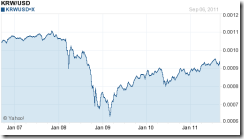Even if the mining sector could be in a consolidation phase over the coming week/s, this would likely be temporary event.
A Resurgent Boom in Global Gold Mining Stocks?
With gold prices drifting just a few percentages below the newly established record levels at over $1,900, gold mining stocks in the US, Canada and South Africa seem headed for a breakaway run following what seems like a serial or concerted breakout attempts from about one year period of consolidation.
This can be seen in the charts of US major mining indices, such as the CBOE Gold Index (GOX), the Gold Bugs Index – AMEX (HUI), the Gold & Silver Index - Philadelphia (XAU) and the DJUSPM Dow Jones Gold Mining Index, where except for the XAU which is at the resistance levels, the rest are in a resistance breakout mode.
While price actions of the local mining index has had little correlations with international mining indices, one cannot discount the possibility that a continuity of the recent price advances or of the breakaway run of global mining issues may also filter into local issues.
And considering that local participants have increasingly been more receptive to the mining industry, then share prices of the composite members may just get a second wind going into the yearend.
And part of the mainstream story has been the recent $14 billion political economic concessions[1] “investments” ‘within the next 5 years’[2] signed in China by President Aquino during his latest State visit.
The local mining industry has easily become a political tool for gaining approval ratings.
Mounting Inflationism is a Plus For Gold
The unravelling European debt crisis and the conventional wisdom of heightened recession risks appear to be provoking more aggressive policy responses from a previously ‘dithering’ officialdom.
Central banks as the Swiss National Bank have aggressively been inflating the system[3] allegedly to curb the rise of the franc (which in reality has been part of the scheme to save European banks). South Korea has also reportedly been into the game too[4] but at a modest scale.
Yet as the crisis deepens, political pressure will bear down on political authorities who have represented the inflation hawks camp or dissidents of QEs or asset purchases by central banks such as ECB’s Juergen Stark who recently resigned out of policy schism.
US Federal Reserve chair Ben Bernanke has once again signalled that further ‘credit easing’ (a.k.a. inflationism) is on the table, aside from proposing to modify the mix of the Fed’s existing balance sheet via the ‘Operation Twist’ or the lowering of long term interest rates in order to induce the public to take upon more risk[5]. The Fed’s trial balloon or public communications management or conditioning tool comes in conjunction with President Obama’s $447 jobs program, apparently meant to shore up the latter’s sagging chances for re-election.
In other words, political “do something” about the current economic problems is being impressed upon to the public for their acceptance or for justifications for more political interventions from both the fiscal and monetary dimensions.
And it wouldn’t signify a farfetched idea that a grand coordinated QE project or credit easing measures by major central banks something similar to the Plaza Accord as predicted by Morgan Stanley’s analysts could be in the works too[6]. The Plaza Accord was a joint intervention in the currency markets by major economies to depreciate the US dollar in 1985[7]. This time, perhaps, the biggest economies will all act in concert to devalue their currencies impliedly against commodities.
Thus, any of the realization of these ‘arranged or independent’ acts to reflate the system to stem the current wave of liquidations of malinvestments meant to preserve the troika political system of the welfare-warfare state, the central banking and banking cartel and to further attain a permanent state of quasi-booms would be exceedingly bullish for gold.
The current stream of inflationism would be added on top of the existing ones which only would expand the fragility of the incumbent but rapidly degenerate monetary system.
Finally I would like to add that while many see mines as ‘investment’, my long held view is that in absence of a local spot and futures market for commodities, local mining issues would represent as proxy to direct gold ownership or as insurance against mounting policies aimed at destroying the purchasing power of the legal tender based paper money system for Philippine residents.
As gold has been shaping up to be the main safe haven or as store of value, so will gold’s function be represented here. This is where the divergences will likely hold—the gold mining sector.
At this very crucial time, I would seek haven in gold and precious metals.
[1] See P-Noy’s Entourage is a Showcase of the Philippine Political Economy August 31, 2011
[2] Inquirer.net $14-B investments in mining eyed from China within the next 5 years, September 7, 2011
[3] See Hot: Swiss National Bank to Embrace Zimbabwe’s Gideon Gono model September 6, 2011
[4] See South Korea Joins the Currency Devaluation Derby, September 8, 2011
[5] See US Mulls ‘official’ QE 3.0, Operation Twist AND Fiscal Stimulus, September 9, 2011
[6] See Will the Global Central Banks Coordinate a Global Devaluation or Plaza Accord 2.0? September 9, 2011
[7] Wikipedia.org Plaza Accord







